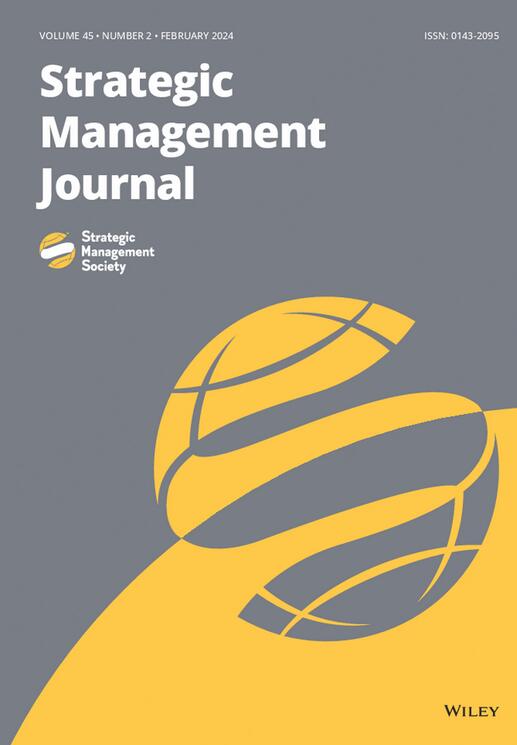公敌?声誉和名人效应对企业不当行为丑化的不同影响
IF 7.2
1区 管理学
Q1 BUSINESS
引用次数: 0
摘要
研究摘要我们通过关注声誉和名人背后的理性和情感基础来探讨不当行为丑化的前因,并考虑它们如何根据不当行为的客观和感知严重程度来提高或降低不当行为被丑化的可能性。具体而言,我们认为客观不当行为严重程度的可量化性会增强声誉的理性影响力,但会削弱名人的感性吸引力。相反,感知到的不当行为严重性会降低声誉的影响力,同时增强媒体对名人公司行为的兴趣。我们基于企业数据泄露事件的研究结果证实,客观严重性扩大了声誉效应,削弱了名人效应,而感知严重性扩大了名人效应,削弱了声誉效应。我们的研究结果凸显了社会评价的社会认知内容在理解为什么只有某些不当行为会被丑化方面的重要性。然而,除了知名企业的不当行为会吸引媒体关注这一模糊概念外,人们对社会评价如何影响只有部分企业的不当行为被丑化的原因知之甚少。我们发现,企业评价的理性和感性基础都很重要。基于对企业能力的理性评估,高声誉会增加客观严重的不当行为被丑化的可能性,而随着客观严重程度的增加,名人效应的影响会减弱--名人效应源于受众对企业非传统特征和行为的情感共鸣。相反,随着媒体 "可获得性级联 "的增长和认知严重性的提高,声誉的影响力会减弱,而名人的影响力会增强。除了对媒体行为进行更真实的描述外,我们还对不当行为发生后的沟通和补救措施提出了见解。本文章由计算机程序翻译,如有差异,请以英文原文为准。
Public enemies? The differential effects of reputation and celebrity on corporate misconduct scandalization
Research SummaryWe explore misconduct scandalization's antecedents by focusing on the rational and emotional bases underlying reputation and celebrity, and considering how they can enhance or reduce the likelihood misconduct is scandalized as a function of the misconduct's objective and perceived severity. Specifically, we argue the quantifiable nature of objective misconduct severity enhances reputation's rational influence, but attenuates celebrity's emotion‐based appeal. Conversely, perceived misconduct severity reduces reputation's influence, while enhancing the media‐driven interest in celebrity firms' behaviors. Our findings based on corporate data breaches confirm that objective severity amplifies reputation's effect and attenuates celebrity's effect, while perceived severity amplifies celebrity's effect and attenuates reputation's effect. Our findings highlight the importance of social evaluations' sociocognitive content in understanding why only some misconduct becomes scandalized.Managerial SummaryCommitting misconduct is costly; having it scandalized is devastating. Yet little is known about how social evaluations influence why only some firms' misconduct is scandalized, beyond the vague notion that prominent firms' misconduct attracts media attention. We find that the rational and emotional bases of firms' evaluations matter. High reputation, based on the rational assessment of firms' capabilities, increases the likelihood of scandalization for objectively severe misconduct, and the influence of celebrity—originating from audiences' emotional resonance with firms' unconventional traits and behaviors—weakens as objective severity increases. Conversely, reputation's influence weakens, and celebrity's influence strengthens, as media “availability cascades” grow and increase perceived severity. In addition to providing a more realistic portrayal of media behavior, we offer insights into post‐misconduct communications and remedial actions.
求助全文
通过发布文献求助,成功后即可免费获取论文全文。
去求助
来源期刊

Strategic Management Journal
Multiple-
CiteScore
13.70
自引率
8.40%
发文量
109
期刊介绍:
At the Strategic Management Journal, we are committed to publishing top-tier research that addresses key questions in the field of strategic management and captivates scholars in this area. Our publication welcomes manuscripts covering a wide range of topics, perspectives, and research methodologies. As a result, our editorial decisions truly embrace the diversity inherent in the field.
 求助内容:
求助内容: 应助结果提醒方式:
应助结果提醒方式:


